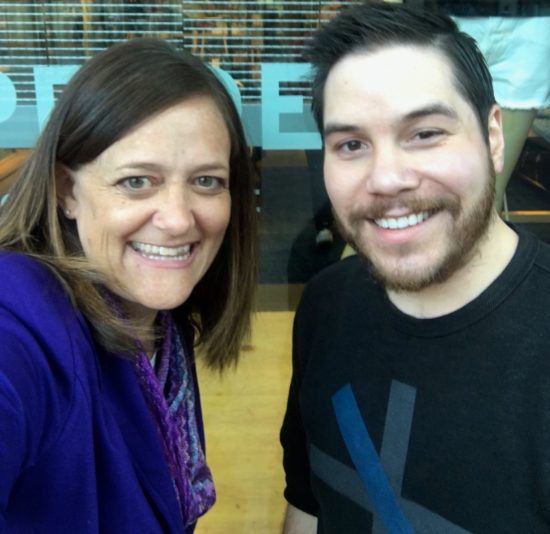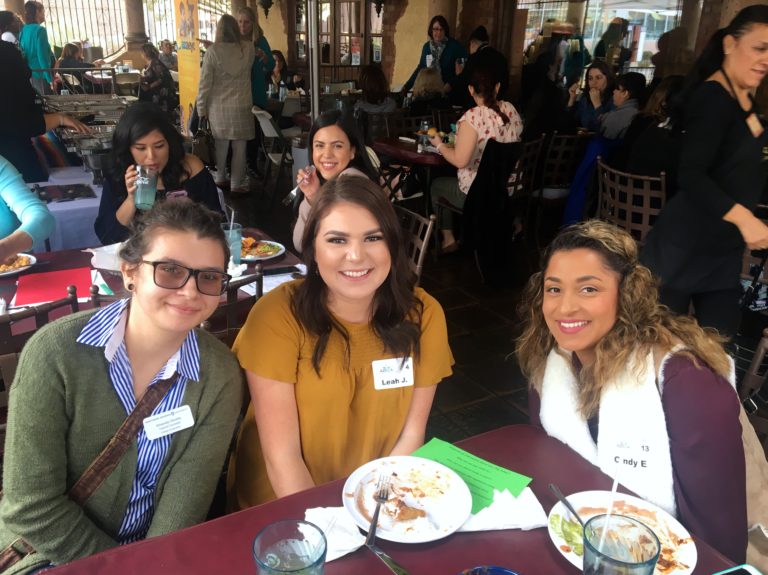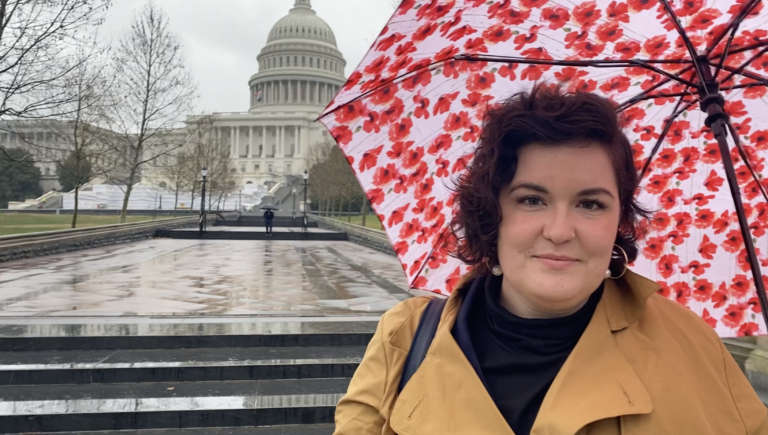By Vicki Louk Balint | May 24, 2018
Meet some of the 2018 ECE Graduates from around the state of Arizona! A few new grads from Central Arizona College, Mesa Community College and Northland Pioneer College weigh in on what drew them to the field of early childhood education, how they met the challenges of earning a degree, and what the future holds. Allison Landy, EdD, Early Childhood Department Chair of Northland Pioneer College, shares her perspective on the ECE graduation experience.
Central Arizona College
Monica Krantzman and Mayra Bojorquez
Why did you enter the field of early childhood education?
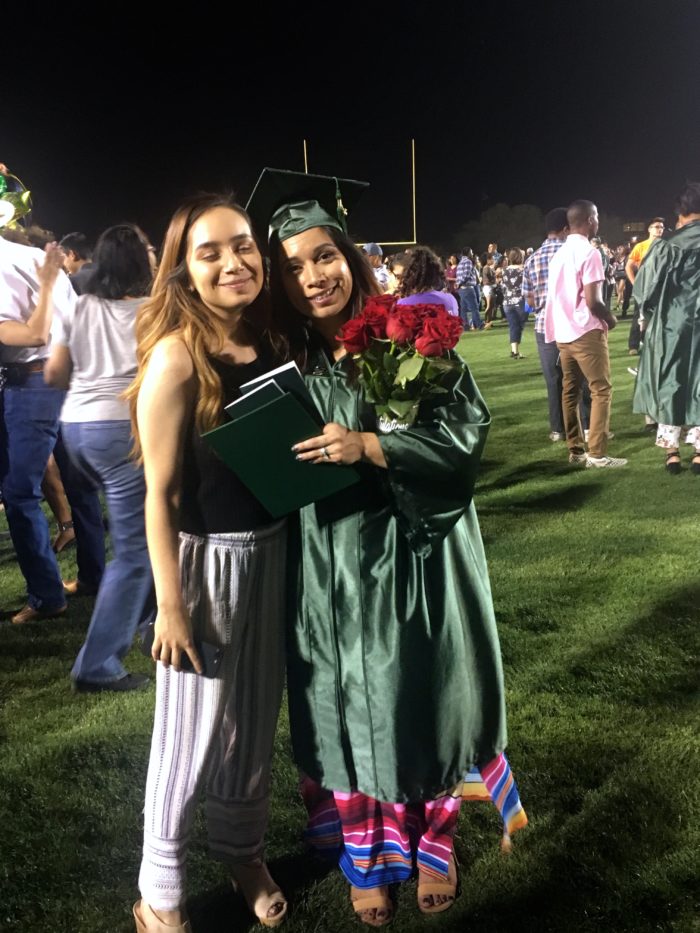
Monica
I have always just liked to be around kids. I like to see them learn and I was always the typical aunt that had all the kids all the time when I was younger. My daughter had a big influence on that and I just loved to see her learn. Then, I actually started working in the early childhood program where I am now. I like to see those little connections children make when they actually learn. That’s the part that I love. It just all came together.
Mayra
I honestly find myself working better with children than with adults. I’m that girl that has grown up with a big family. I’ve always been around children. I’ve always taken care of all my nieces and nephews, younger brothers and sisters.I played school with my younger siblings, I was a teacher, they were my students. It’s always been something I felt passionate for; I can’t see myself in another field but education.
Once you started to formally study early childhood ed, what stands out that you discovered that you may not have previously realized about the profession?
Monica
The science and the research and the actual foundations of early childhood, and the impact that that has on children from the time they’re in the womb.These are facts. It’s not just a job, it’s an actual career. That made a difference to me too, and to my parents and my sisters and my brothers, where now they look at early childhood as a career, a profession, rather than just babysitting. Not only were we learning as students, but we’re also educating the people around us to hopefully start that ripple effect.
When I graduated, my aunts and my uncles and my cousins were over. So they’re like, “Oh, so it is a career. It is a profession.” And I said, “Yes, it is.” So I think slowly but surely, we’re getting there.
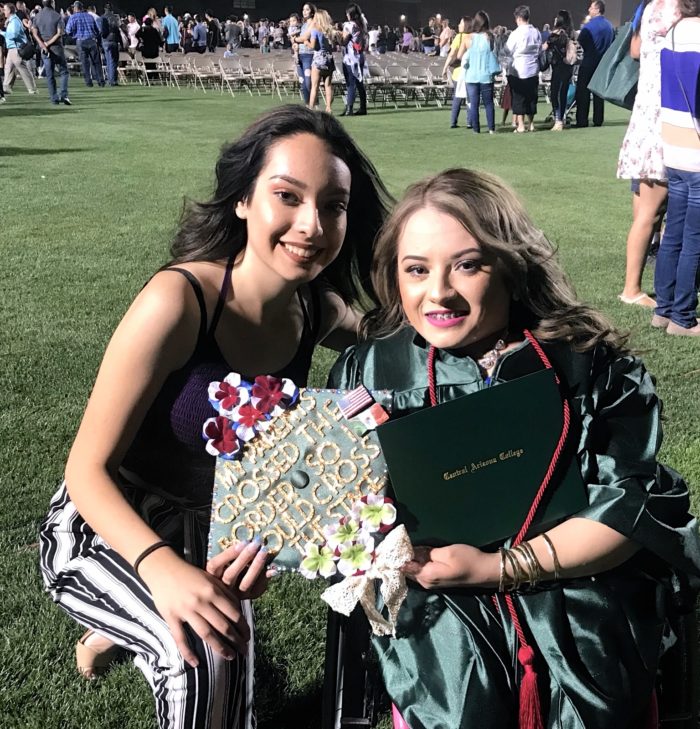
Mayra
With the Central Arizona College early learning center, I never truly understood play-based learning until I started working there. I always felt like, oh they’re just playing. They’re not really doing anything. But once I started working there and I was able to take my ECE classes I understood more. Children are doing this because they’re trying to get their motor skills to run or they’re trying to understand how things work. They are learning!
What would you like the public to know about what you do?
Monica
It’s important for them to know the impact that early education has for the teachers and aides that are with their young children. It is important that the person is educated in best practices, because they are laying the foundation for the child’s future. The environment is uberly important. But the person who a parent chooses to leave their child with also has to have that background to help the child develop and be successful. I think a lot of people don’t really get it where they think, “Oh, the neighbor. She can babysit. It’s fine.” And it’s like, “Wait. But are they really letting this child flourish?” It’s an awareness.
Mayra
Our profession is not babysitting. It’s actually teaching and helping children become successful.
What are your next steps?
Monica
I’m going straight into my bachelor’s program, hopefully in fall at the University of Arizona South for my Bachelor’s in Early Childhood.
Mayra
I’m going to finish my elementary associate degree. But I’m also going to go ahead and start at Northern Arizona State and get my bachelor’s degree. I’m not sure whether it’s going to be early childhood or elementary. I really haven’t made up my mind yet.
Mesa Community College
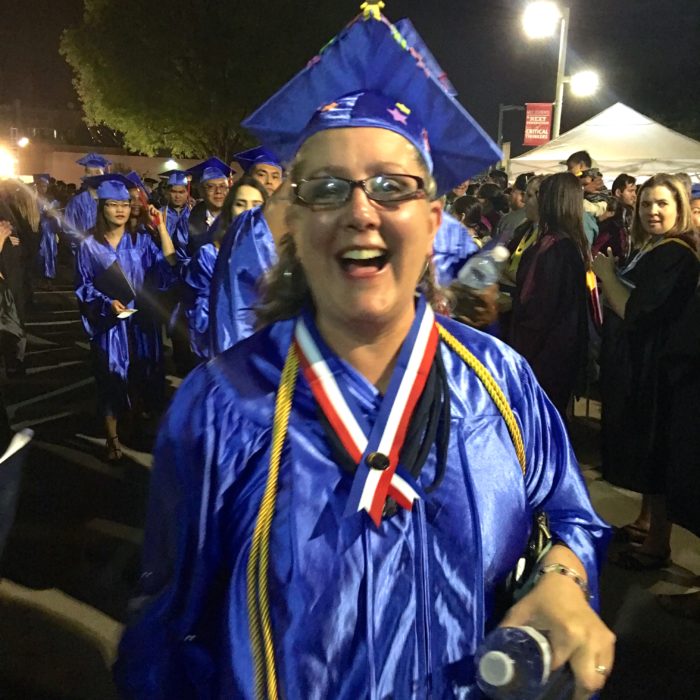
Connie Torres and Brittany Bomboy
Why did you enter the field of early childhood education?
Connie
Children have always been attracted to me and me to them. I have two children. Children are transparent, they are so open and honest I felt like it was my destiny. I started a little “pre- school” at my home. But once I started actually studying at MCC, I realized it was not actually a preschool! I also worked at a preschool and I became very disillusioned. I realized I just didn’t have the goods, I needed more. You can’t fake that! So I left to begin my studies.
Brittany
When I was in sixth grade, I started volunteering with my church nursery with one-year-olds. In high school, I did an internship at a preschool and I absolutely loved it and decided to make that my career path.
I have worked with kids of all different ages, but I have a passion for birth to five. I seem to connect, and I really love the creativity that goes in to it.
What were some of the challenges you faced as you worked toward your degree?
Connie
I didn’t have to work full time and go to school, but being the oldest student was a challenge. People make lots of assumptions — that you already know the material. I had a chance to work in a variety of classrooms, which was a real learning experience. One was a charter preschool. I asked the teacher if I could observe the children in dramatic play. They had no dramatic play area in the classroom, so he tried to set something up. The children didn’t know what to do! Then the teacher started putting out worksheets on a table and they slowly gravitated over to do a worksheet. The teacher said, “See, this is what they want to do.” Unbelievable.
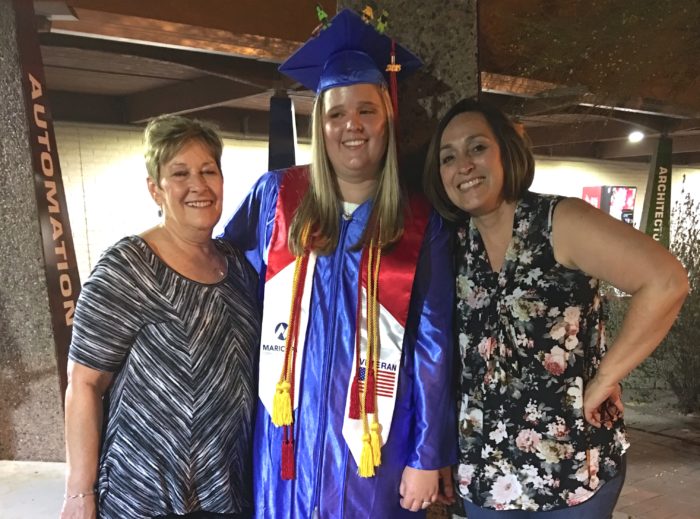
Brittany
For me, the biggest challenge was being confident. I am actually blind. I’ve had people not complete my interview or throw my resume away, they wouldn’t call me back. Coming in to the field I was discouraged, I didn’t know if I could do it.
In my program at MCC, however, I had wonderful teachers who were really accommodating, every assignment I was able to do, they were creative.
I built friendships, group work, internships, was able to label the kids cubbies and job boards with braille. The children got to take their braille name tags home, some learned how to write their names in braille.
I can get down on their level, I am always aware, I just have to be more proactive than a sighted person sometimes.
What would you like the public to know about what you do?
Connie
Parents need to know how hard kids work at school, even preschool. We need to slow it down and focus on the community aspects that the classroom has to offer. We need to stand up against some of this standardized testing. ECE is key to bridge the gap so that we have fewer casualties later on.
Brittany
I always emphasize that we have a “babysitter” or “caretakers” stigma. Young children have so much to learn, and it is our job to make sure they are given the opportunities.
Some people think we just give them snacks and we play with them. But if they are in the block area, they can sort small and big. They do open-ended art and they have a story to tell about it. Giving parents those models, putting ourselves out there, going to trainings and continuing education can help ECE professionals to strike down some of those misconceptions.
What are your next steps?
Connie
I’m on the fence, I could be an aide. Everyone should have an aide — teachers have too much on their plate to do it on their own. If I could push through, I would like to continue with my education and some day have my own classroom. I kick it around. I don’t have an answer. i just know I will always work with children and teachers.
Brittany
I want to continue for my bachelors degree, but want to apply for jobs to see what I can find. Everything I have learned, I want to put it in to practice. My goal is to be a lead teacher and have my own classroom someday.
Northland Pioneer College
Nina Edison
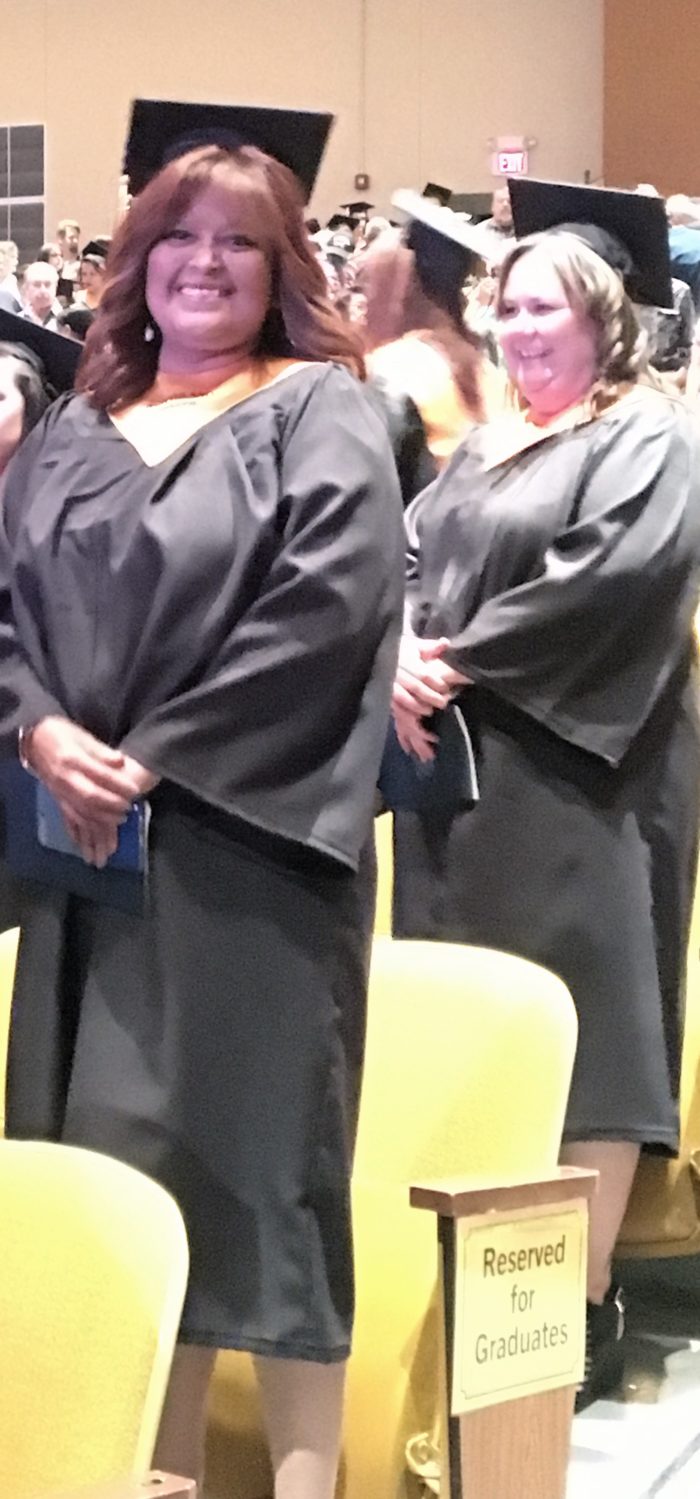
Why did you enter the field of early childhood education?
First of all, I love working with my age group of four and five year-olds. I’ve been offered higher grades —no thank you! You get them first, you are their first teacher. Just to be with that age group and watch the progress- it is amazing and to know you are the reason they are at the place they are after 10 months. It’s the best feeling in the world. I cry like a baby when I have to let them go! But three months later I get a whole new batch.
What were some of the challenges you faced as you worked toward your degree?
It took me about 8 years because I was taking one or two classes at the time. I didn’t realize I was at the stage I was until one of my instructors pointed it out. Every semester I’d take another class. I just wanted to have enough credits to keep my job. When you are a teacher, you go to workshops, training. I wasn’t even thinking of a cap and gown!
The workload was a challenge! From work, lesson plans, documenting, preparing, it’s a lot. I brought work home with me. Learning the new curriculum, teaching strategies, that was all new to me. I’m bad at computers, I’m a dinosaur! So, getting comfortable with technology. I’d work 8 hours and come home dead tired, then switch out my bag and go to class.
What would you like the public to know about what you do?
These children are amazing. I want people to know that I am doing my best to make sure they are doing their best. It is scary for them to go to kindergarten. I am just so happy and so proud to be the person that gets to shape, mold and give them that guidance in the first steps in their education. The progress you see — I am so excited to be a part of that. I love it!
What are your next steps?
This degree has only motivated me to go on. So, this summer, I am going to Prescott and speak with an advisor and figure out a degree plan for my bachelors. Then, who knows? Maybe I’ll do a masters! This will be another challenge – I have been with my job for 10 years, I but I am comfortable with the workload. I think I am ready!
Allison Landy, EdD.
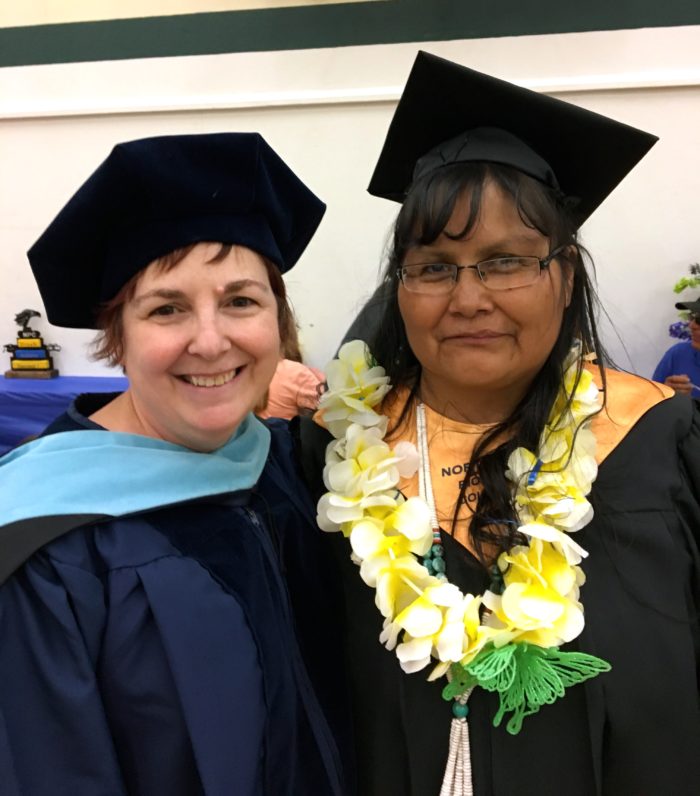
Describe your role at Northland Pioneer College.
I provide oversight of instruction and curriculum for all early childhood programs at the college, instruction to future early childhood professionals, and advisement on college attainment and early childhood professional career goals.
Talk about the achievements of early ed students. Any particular challenges that they face to achieve their degrees?
Students attending Northland Pioneer College are almost 100% all working full-time jobs while attending school. The district served by NPC is the size of West Virginia, and although we have nine campuses in locations from Kayenta to Whiteriver and from Winslow to Show Low, many students still live and work as many as two hours away from the nearest college campus. This is especially challenging when taking classes like biology that require an on-campus visit for labs.
Additionally, many of the students’ homes have no cell phone reception and even more have no internet access.
Oftentimes, students have used personal days or have chosen to take leave without pay from their jobs in order to finish their general education requirements.
How many students earned degrees in ECE (and at what level) this spring in ECE?
This year we had about 12 students earn AA or AAS degrees in early childhood and more earn their Certificates of Proficiency.
How does it feel for you personally to see these students in cap and gown with their families on graduation?
I am truly excited for our students. For so many of them, graduation is the result of years and years of taking just one or two classes a semester, taking time off for family (often putting their own goals on hold), and overcoming multiple hurdles to finish. This year in particular, several graduates had no idea how close they were to being done until we reviewed their plans one on one. Personal, relationship-based advisement has been a real driver for student completion, and I am proud to play a small role in motivating students to cross that final finish line.
What do you want the general public to know about the students, their graduation, and their achievement within this profession?
Students who enter the early childhood profession do so knowing that they will have many challenges ahead. Yet, they do so in spite of those challenges. This makes early childhood professionals some of the most motivated, passionate, and dedicated people around.


